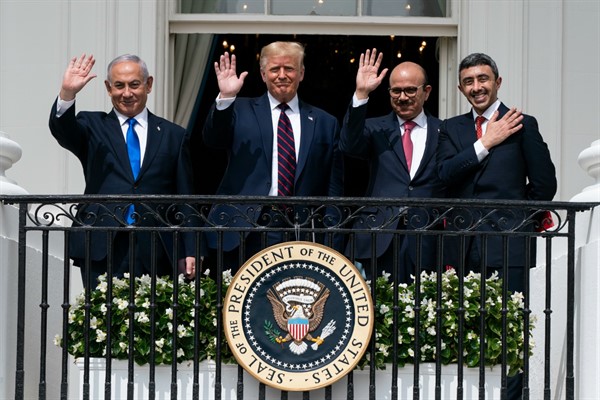Over the past 20 years, the geopolitical landscape of the Middle East has been transformed and reshaped. Old rivalries and historical enmities have hardened and deepened, driving strategic realignments and the emergence of a range of new or newly empowered actors from both within and outside the region. At the same time, political change has been harder to come by. With a few notable exceptions, waves of popular protest movements across the region in both 2011 and last year have failed to achieve the reforms and accountability they have demanded from their governments.
In today’s big picture Trend Lines interview, WPR editor-in-chief Judah Grunstein is joined by Robert Malley to discuss the drivers of recent developments in the Middle East, as well as the global trends shaping conflict and crisis more broadly. Malley is president and CEO of International Crisis Group. Before that he was a special assistant to President Barack Obama, serving as senior adviser for the campaign to defeat the Islamic State and as the White House coordinator for the Middle East, North Africa and the Gulf region. He was also a special assistant to President Bill Clinton for Arab-Israeli affairs and director for Near East and South Asian affairs at the National Security Council during the Clinton administration. Click here to read the full transcript of the interview.
Listen:
Download: MP3
Subscribe: Apple Podcasts | RSS | Spotify
Relevant Articles on WPR:
No More ‘-Isms’: A Non-Ideological Generation Takes to the Streets in the Middle East
This New, Narrow Vision for the Middle East Isn’t Really About Peace
Why Hitting the Pause Button Is the Best the U.S. and Iran Can Hope For
Russia Is Getting More Than It Bargained For in Libya and Syria
How China Is Quietly Expanding Its Economic Influence in the Gulf
If you like what you hear on Trend Lines and what you’ve read on WPR, you can sign up for our free newsletter to get our uncompromising analysis delivered straight to your inbox. The newsletter offers a free preview article every day of the week, plus three more complimentary articles in our weekly roundup every Friday. Sign up here. Then subscribe.
Trend Lines is produced and edited by Peter Dörrie, a freelance journalist and analyst focusing on security and resource politics in Africa. You can follow him on Twitter at @peterdoerrie.
To send feedback or questions, email us at podcast@worldpoliticsreview.com.

